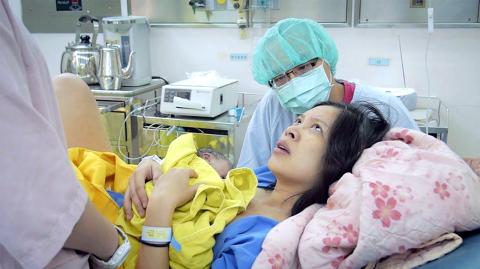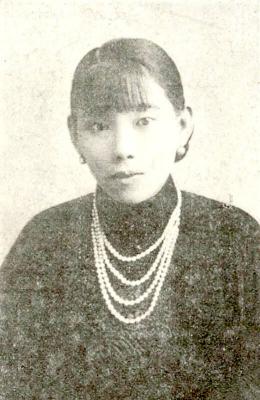If you’ve never witnessed a live birth, you’ll get to see three different types in My Happy Birth Day (祝我好好孕) — head first, butt first and a water birth.
Unlike what’s shown in the movies, childbirth isn’t pretty. But there’s a reason people still go through it, although at a decreasing rate. Directors Mimi Chen (陳育青) and Angel Su (蘇鈺婷) made the right decision to show the entire process as is, to open up discussion in a society where people are still squeamish about the not-so-glamorous aspects of human sexuality and the female body.
It’s telling that My Happy Birth Day was initially rated as PG-12, the official reason being “scenes of childbirth … may have adverse effects on the behavior and mental health of children.”

Photo Courtesy of atmovies.com
The directors objected and managed to have the rating lowered to Protected. Despite the uncensored nudity and full frontal shot of the baby coming out, there’s nothing explicit or sexual about the scenes; if a child can watch a giraffe giving birth on Animal Planet, there’s no reason they can’t watch this movie. In fact, one of the mothers’ two young daughters were present throughout the entire experience, and there shouldn’t be anything taboo about that.
But the documentary is more than just a professionally-produced home video. It is an ambitious project to combine the raw, emotional moments surrounding childbirth (and child loss) with a critical look at Taiwan’s often overly-intrusive medical system, promoting the idea that women have the right to choose how they want to have their baby.
Both subjects insist on having a natural birth, preferring to avoid C-sections and other procedures that hospitals often “strongly recommend” patients to undergo. It also provides an seldom-seen look at the work of midwives and doulas, or non-medical birth companions.
The work is the full-length follow up to Happy Birthday (祝我好孕), a 2016 short by first-time directors that shot up from honorable mention at the New Taipei City International Documentary Festival to snagging a silver at the Women Make Waves Film Festival and finally claiming gold for the short film category at Hong Kong’s Chinese Documentary Festival.
While this reviewer did not watch the short, it seems to have more of an unusual and concentrated narrative, depicting two sisters who both work as midwives and end up delivering each other’s babies. The directors drew from five years of shooting pregnant women to come up with a completely new story for the full-length installation, but the final product carries somewhat of a split personality.
The ingredients are plentiful within the two distinct storylines: Daisy’s (詩薇) is the more emotional one as she goes through two home births, much focus is on the heartwarming and heartbreaking interaction between her family, especially with a loving husband and two daughters who accompany her through the process and a tragedy that ensues. Anais (琬婷) is the critical activist who insists on a completely natural home birth but has to make compromises due to the baby being in the wrong position.
But it doesn’t fit perfectly, perhaps because there’s too much to take in at once, including scenes of a “birthing autonomy theater group” organized by the feminist group Awakening Foundation (婦女新知) that seems like it could be a story on its own. The two storylines, while touching on the common subject of women deciding their own terms of giving birth, are essentially dealing with different conflicts and carry very different emotional undertones.
The film gets the message across in general, with things somewhat tying up toward the end, but it just feels like it could lean more toward the critical side to paint a better picture of what women have to go through that drives them to demand birthing autonomy. So much is focused on the emotional and poignant elements that sometimes the audience forgets that this is partially a social critique.
Still, My Happy Birth Day is a valiant effort that dares to break the mold and challenge stereotypes, which is desperately needed in a largely unimaginative and formulaic film scene. And unlike the often unusual topics favored by documentary filmmakers, everyone knows someone who’s given birth, making it an even trickier subject to tackle.
Documentaries don’t draw large crowds, especially with this kind of non-mainstream subject matter, but the directors are raising funds to show it in as many venues as possible, with last month’s premieres featuring seminars on body autonomy as well as men and other childrens’ role in childbirth.
My Happy Birth Day probably isn’t going to boost Taiwan’s birth rate, but it will make for more discussion that’s beneficial to those who plan to have children.

Many people noticed the flood of pro-China propaganda across a number of venues in recent weeks that looks like a coordinated assault on US Taiwan policy. It does look like an effort intended to influence the US before the meeting between US President Donald Trump and Chinese dictator Xi Jinping (習近平) over the weekend. Jennifer Kavanagh’s piece in the New York Times in September appears to be the opening strike of the current campaign. She followed up last week in the Lowy Interpreter, blaming the US for causing the PRC to escalate in the Philippines and Taiwan, saying that as

US President Donald Trump may have hoped for an impromptu talk with his old friend Kim Jong-un during a recent trip to Asia, but analysts say the increasingly emboldened North Korean despot had few good reasons to join the photo-op. Trump sent repeated overtures to Kim during his barnstorming tour of Asia, saying he was “100 percent” open to a meeting and even bucking decades of US policy by conceding that North Korea was “sort of a nuclear power.” But Pyongyang kept mum on the invitation, instead firing off missiles and sending its foreign minister to Russia and Belarus, with whom it

The Chinese Communist Party (CCP) has a dystopian, radical and dangerous conception of itself. Few are aware of this very fundamental difference between how they view power and how the rest of the world does. Even those of us who have lived in China sometimes fall back into the trap of viewing it through the lens of the power relationships common throughout the rest of the world, instead of understanding the CCP as it conceives of itself. Broadly speaking, the concepts of the people, race, culture, civilization, nation, government and religion are separate, though often overlapping and intertwined. A government

Nov. 3 to Nov. 9 In 1925, 18-year-old Huang Chin-chuan (黃金川) penned the following words: “When will the day of women’s equal rights arrive, so that my talents won’t drift away in the eastern stream?” These were the closing lines to her poem “Female Student” (女學生), which expressed her unwillingness to be confined to traditional female roles and her desire to study and explore the world. Born to a wealthy family on Nov. 5, 1907, Huang was able to study in Japan — a rare privilege for women in her time — and even made a name for herself in the